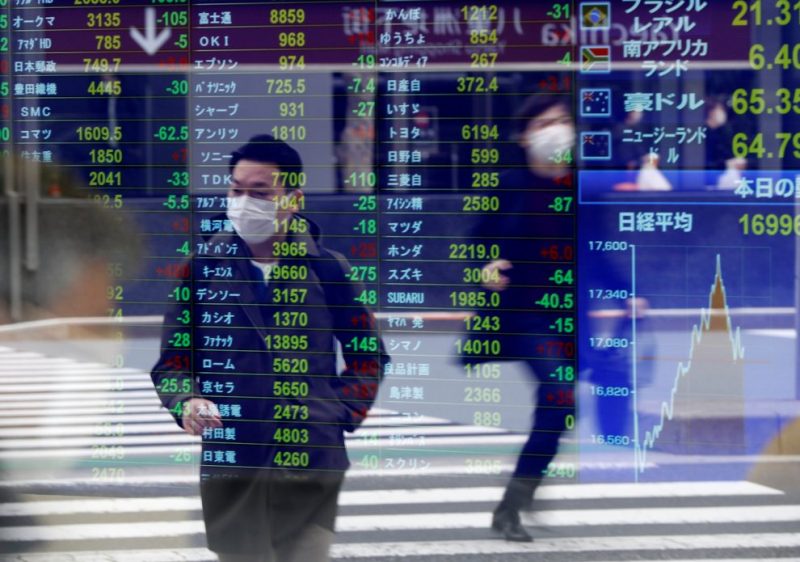Most of Asia’s major markets followed in Tokyo’s positive wake on Monday after a win for Japan’s ruling party in the weekend’s general election sparked hopes of fresh economic stimulus – though Hong Kong suffered after new data showed further weakness in China’s economy.
News that inflation had hit a 30-year high in the United States and a 13-year peak in the eurozone added to long-running concerns that price rises are in danger of running out of control, while piling more pressure on central banks to tighten monetary policy.
The spotlight is now on the Federal Reserve’s meeting this week, where it is expected to unveil a timetable for tapering its vast bond-buying programme, while boss Jerome Powell’s statement afterwards will be followed for an idea about when it will start hiking interest rates.
Read more: Japan’s Nikkei Up More Than 2% After LDP Election Win
Expectations for higher US rates have rallied the dollar and put it on course for 115 yen for the first time since early 2017.
The decision comes as the Bank of England is tipped to lift rates this week, following in the footsteps of other financial authorities in South Korea, New Zealand and Singapore, among others.
While investors are coming to terms with the prospect of rising borrowing costs, markets continue to press higher, with all three main indexes on Wall Street ending at records on Friday, thanks to a largely healthy earnings season.
Tokyo took up the mantle in Asia on Monday, rallying more than 2% after Prime Minister Fumio Kishida won a strong majority in the weekend poll, giving him the freedom to push through a big-spending spending programme to kick-start the stuttering economy.
He has previously said he would pursue a programme worth tens of trillions of yen. The win for Kishida also provided some optimism for stability.
The benchmark Nikkei 225 index jumped 2.61% or 754.39 points to end at 29,647.08, while the broader Topix index gained 2.18% or 43.54 points to 2,044.72.
Contracting Factory Activity
There were also gains in Sydney, Seoul, Singapore, Taipei and Mumbai, while Wellington, Bangkok and Jakarta dipped.
Hong Kong and Shanghai also fell after China released data on Sunday showing factory activity contracted more than expected in October owing to the supply crunch, rising input costs and new lockdowns to fight another Covid outbreak.
The reading will add further pressure on the government to provide more support for the world’s number two economy but authorities have to tread a fine line as they battle to contain inflation.
The Hang Seng Index shed 0.88%, or 222.92 points, to 25,154.32. The Shanghai Composite Index dipped 0.08%, or 2.86 points, to 3,544.48, though the Shenzhen Composite Index on China’s second exchange rose 0.49%, or 11.75 points, to 2,411.78.
Improving Domestic Demand
“The jump of [the] output price index in October is alarming,” Zhang Zhiwei at Pinpoint Asset Management said. “This could lead to higher pressure on [consumer] inflation and limit the space of monetary policy easing.”
There was a little relief from privately compiled data released by Caixin that showed a slight improvement in the manufacturing sector thanks to improving domestic demand.
Still, while investor sentiment has waned over the past year, observers remain upbeat. “Having been bullish on equities it feels right to turn a touch more cautious this week,” Chris Weston, at Pepperstone Financial, wrote in a note. “Although, the fact that equities have held up so well considering the rapid repricing of interest rates is certainly a positive.”
MARKETS
Tokyo > Nikkei 225: UP 2.6% at 29,647.08 (close)
Hong Kong > Hang Seng Index: DOWN 0.9% at 25,154.32 (close)
Shanghai > Composite: DOWN 0.1% at 3,544.48 (close)
New York > Dow: UP 0.3% at 35,819.56 (close)
- AFP with additional editing by Sean O’Meara
Also on AF:
China Factory Activity Falls Even as Output Prices Surge
China Developer Offers To Swap US Bonds to Avoid Default
























